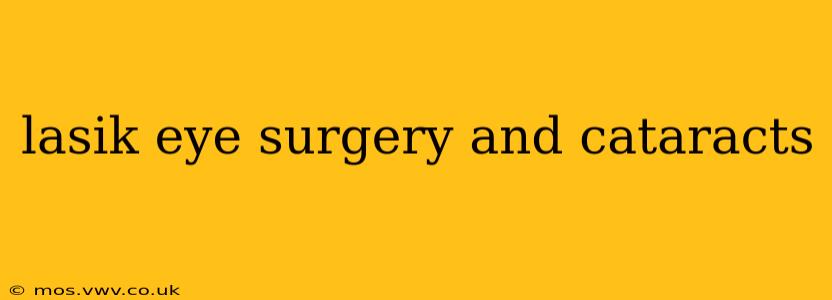LASIK (Laser-Assisted In Situ Keratomileusis) and cataracts are both eye conditions that affect vision, but they impact different parts of the eye and are treated differently. Understanding the relationship between the two is crucial for anyone considering LASIK or dealing with cataract formation. This comprehensive guide will explore the nuances of both conditions, their potential interactions, and how to navigate the complexities of treatment.
What is LASIK Eye Surgery?
LASIK is a refractive surgery designed to correct refractive errors such as nearsightedness (myopia), farsightedness (hyperopia), and astigmatism. The procedure reshapes the cornea, the clear front part of the eye, to improve the focusing of light onto the retina, thus enhancing visual acuity. LASIK uses a laser to precisely ablate (remove) a small amount of corneal tissue, altering its curvature. The procedure is generally quick and relatively painless, with most patients experiencing significant improvement in their vision immediately following the surgery.
What are Cataracts?
Cataracts are a clouding of the eye's natural lens, located behind the iris and pupil. This clouding interferes with the passage of light to the retina, resulting in blurry, hazy vision. Cataracts typically develop gradually over time, often associated with aging, but can also be caused by other factors such as eye injuries, certain medications, or underlying health conditions. Unlike LASIK, which affects the cornea, cataracts affect the lens.
Can I Have LASIK If I Have Cataracts?
No, you generally cannot have LASIK if you have cataracts. LASIK reshapes the cornea to correct refractive errors, but it doesn't address the clouded lens characteristic of cataracts. In fact, the presence of cataracts might complicate the LASIK procedure and lead to less predictable results. Cataract surgery, which involves removing the clouded lens and replacing it with an artificial intraocular lens (IOL), is the appropriate treatment for cataracts.
Can I get LASIK after cataract surgery?
Yes, you can often get LASIK after cataract surgery, but it depends on several factors. Once the cataract surgery has fully healed, and your vision has stabilized, a LASIK procedure might be considered to further refine your vision correction if needed. However, your ophthalmologist will need to assess your corneal health and overall eye condition to determine suitability. This is often discussed post-cataract surgery. The surgeon may use an IOL that significantly reduces the need for further refractive correction.
Can LASIK Cause Cataracts?
While LASIK itself doesn't directly cause cataracts, some studies suggest a possible correlation between LASIK and an increased risk of developing cataracts earlier than expected or at a faster rate. However, this risk is generally considered low and the benefits of LASIK often outweigh the potential risk for many individuals. The relationship is complex and not fully understood, so it's essential to discuss this with your ophthalmologist.
How does age affect the decision of whether to have LASIK or cataract surgery?
Age plays a significant role in the decision-making process. Younger individuals with refractive errors are more likely to be candidates for LASIK, while older individuals with cataracts are better suited for cataract surgery. The presence of early-stage cataracts might contraindicate LASIK. Your ophthalmologist will assess your age, overall eye health, and the severity of both conditions to recommend the most appropriate course of action.
What is the difference between LASIK and Cataract surgery?
| Feature | LASIK | Cataract Surgery |
|---|---|---|
| Affected Part | Cornea | Lens |
| Purpose | Correct refractive errors | Remove clouded lens and replace with IOL |
| Procedure | Laser reshaping of the cornea | Surgical removal of the lens |
| Recovery Time | Relatively short, days to weeks | Longer, weeks to months |
This detailed comparison clarifies the distinct nature of these procedures and their appropriate applications. Always consult with a qualified ophthalmologist to determine the best treatment option for your specific needs. Remember, this information is for educational purposes and should not substitute for professional medical advice.
